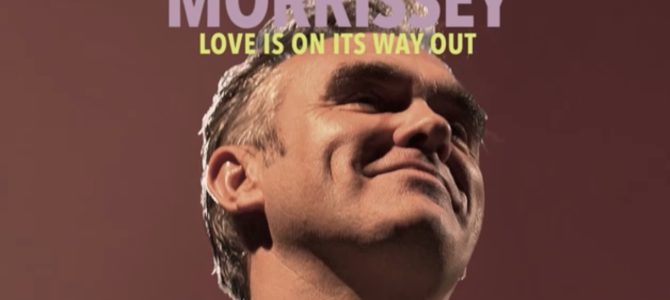Last week, the almost-cancelled 1980’s, 90’s, and now’s alt-music star Morrissey dropped a new single. It somehow manages to be a complete surprise while fitting onto his oeuvre like a glove. “Love Is On Its Way Out” is the most Morrissey of Morrissey song titles. He is almost mocking his own maudlin tendencies, but inside this song there is a lot to think about.
The song begins with its title, and Morrissey matter of factly explains that love is on its way out. It’s tired, it’s done, it’s over. Throughout his career Morrissey has taken a skeptical view of love. Usually he expresses that he is not worthy of it. In songs like “I Want The One I Can’t Have,” Morrissey paints himself as un-lovable, the title of another of his songs.
The bizarre joke about Morrissey has always been that his fans think he’s super hot with his strong jaw and erect puff of black hair, yet he paints himself as a grotesque gargoyle. This tension has worked its way throughout his entire time in the spotlight. Johnny Carson, the most affable and bright guy on TV, often admitted he was hopelessly shy, what we saw was deflection. So it is with Morrissey.
Love is on its way out. It doesn’t seem like any specific love. This isn’t a break-up, yet. This is love generally. It moves into kids being victims of war and the “sad rich” killing elephants and lions. Quick note here that big-game hunting actually provides considerable funding for conservation, but, setting that on one side: Morrissey is talking about love leaving the world.
Might we wonder if this is true? Is love leaving the world? Do we just hate each other now? Do we refuse to shake hands and rip up speeches? Do we glare at the enemy with glowing animosity? We often do. We probably have a problem.
The song is unique for Morrissey, as it not guitar-driven. Moz has been blessed with absurd guitar talent. As front man for the Smiths, he sang alongside Johnny Marr, a master of the Rickenbacker with no rival. Since going solo, Morrissey has crooned above Boz Boorer, a more workmanlike version of Marr but with his own magic.
But not on this track. The backing here is almost purely electronic. It’s a synth pop style that feels foreign to Morrissey, who at the end of the day, even though it seems weird, is more a rock star than a pop star. But his voice rises above the digital beats as usual, a little bored, a little distracted, until the end.
After, I don’t know, a harpsichord solo? Flush with vague soprano flourishes, the song launches into its coda. And the guitars are back. The niche pop Morrissey tune is suddenly a severe and meaningful one. He’s not joking now. He asks that before love goes, before it makes its bow and exit that someone, we never know who, take the time to show him what its like. As much actor as singer as he always is, he begs. The song turns.
“Take time, be mine and gaze with fondness on the wrong one.” It’s Morrissey understanding his entire philosophy. One based in simple moments that don’t come often enough. A look across a table that makes you think you have value. But also the recognition that you can never truly be what people want you to be.
I had a wonderful history teacher in high school named Don Kawash who was also a professional ragtime piano player. One day I had lunch with him, when he was in his 60s. He said, “David, when I was 25 I could hit any note, but I didn’t know what they meant. Now I know what they mean but I can’t hit them all.” Morrissey knows what the notes mean now and he’s hitting them. This is no retro act; he is making some of his very best music.









